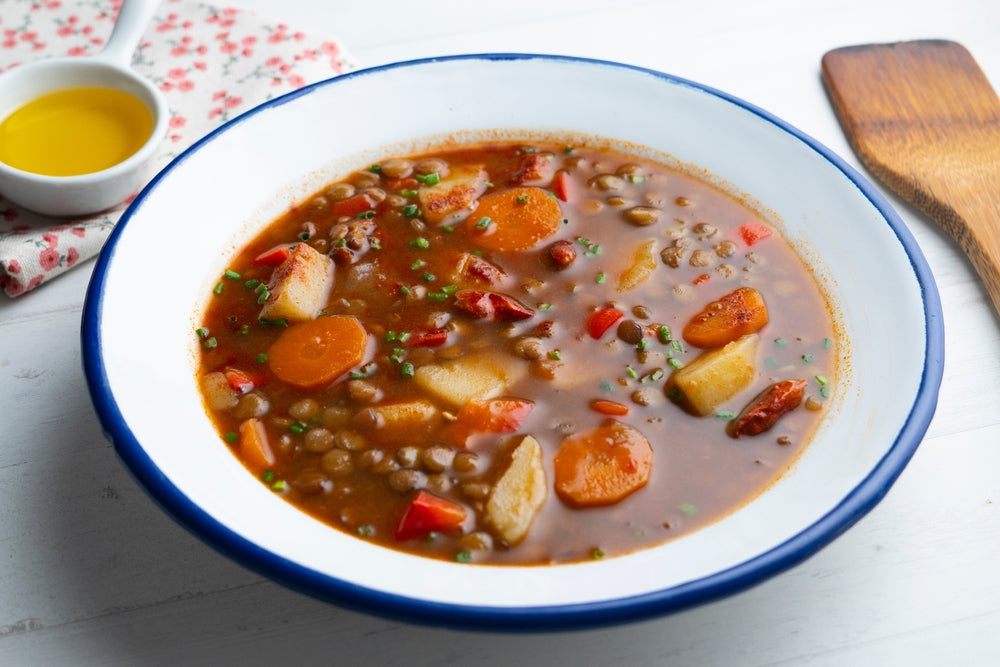Top Foods for a Flourishing Gut

Paying attention to gut health is all the rage these days, and for good reason.
The discovery of axes between the gut and non-gastrointestinal organ systems (e.g., gut-brain and gut-skin axis) has uncovered the links between gut health and the development of various chronic health conditions.
Translation: your gut health is vital to your overall health. So, how can you make sure your gut is in tip-top condition? A big part of it comes down to your diet.
These are four foods to improve your health from the inside out.
#1: Fruits and vegetables
More specifically, focus on fruits and vegetables rich in soluble fiber that dissolves in water.
Unlike insoluble fiber, many soluble fibers are prebiotics—substances that your “good” gut bacteria break down (via fermentation) to get energy. This (fermentation) process supports a healthy, flourishing gut microbiome by:
But you may be wondering, “How much soluble fiber should I eat? And which fruits and vegetables are high in soluble fiber?”
While there is no dietary reference intake for dietary fiber, many experts recommend a daily intake of 25 to 30 grams, with about a quarter (6 to 8 grams) coming from soluble fiber. Here are five fruits and vegetables that are high in soluble fiber:
|
Food |
Serving size |
Soluble fiber content (g) |
|
Black beans |
½ cup |
|
|
Brussels sprouts |
½ cup |
1.8 |
|
Turnips |
½ cup |
1.7 |
|
Carrots |
1, 7½ in. long |
1.1 |
|
Bananas |
1 medium |
#2: Whole grains
Like fruits and vegetables, whole grains are also a great source of soluble fiber—i.e., prebiotics, which do a whole lot of good for your gut health.
You don’t have to take that statement at face value: according to a 2019 review, whole grains consumption was associated with a more diverse gut microbiome, which functions better than one with only a few kinds of bacteria.
Before you ask, here’s a list of whole grains and their soluble fiber content:
|
Food |
Serving size |
Soluble fiber content (g) |
|
Barley, cooked |
½ cup |
3.3 |
|
Brown rice, cooked |
½ cup |
1.3 |
|
Oatmeal, cooked |
1 cup |
2.4 |
|
Popcorn, air-popped |
3 cups |
3.2 |
|
Quinoa, cooked |
½ cup |
1.7 |
#3: Omega-3 fatty acids
A diet rich in omega-3 fatty acids is linked to a more diverse gut microbiome. And, at this point, you already know what that means: yep, a healthier gut.
There are three main types of omega-3 fatty acids:
- EPA (eicosapentaenoic acid): A “marine omega-3” found in fish.
- DHA (docosahexaenoic acid): Another “marine omega-3” found in fish.
- ALA (alpha-linolenic acid): Omega-3 found in plants.
While there is no official recommended daily allowance for EPA and DHA, most mainstream health organizations recommend a minimum of 250 to 500mg combined EPA and DHA for healthy adults.
On the other hand, the adequate intake (AI) for ALA is:
|
Age |
Male |
Female |
Pregnancy |
Lactation |
|
19 to 51+ years |
1.6 |
1.1 |
1.4 |
1.3 |
So, which foods are high in omega-3s? Here’s a handy list to refer to:
|
Food |
ALA/serving (g) |
DHA/serving (g) |
EPA/serving (g) |
|
Chia seeds, 1oz |
5.06 |
||
|
English walnuts, 1oz |
2.57 |
||
|
Flaxseed, whole, 1 Tbsp |
2.35 |
||
|
Edamame, ½ cup |
0.28 |
||
|
Salmon, cooked, 3oz |
1.24 |
0.59 |
|
|
Herring, cooked, 3oz |
0.94 |
0.77 |
|
|
Mackerel, cooked, 3oz |
0.59 |
0.43 |
#4: Probiotics
Previously, you learned about prebiotics—foods that serve as an energy source for “good” gut bacteria.
Now, we’re talking about probiotics; these are the actual, live strains of beneficial gut bacteria that make up your gut flora. These help increase gut microbiome diversity and promote balance. Probiotic fermented foods you could add to your diet include:
- Natural yogurt
- Kefir
- Kombucha
- Sauerkraut
- Pickles
- Miso
- Tempeh
- Kimchi
- Cheeses that have been aged but not pasteurized
Bottom line? If you want to help your gut flourish, it all comes down to prioritizing soluble fiber (fruits, vegetables, and whole grains), omega-3 fatty acids (fatty fish and nuts), and probiotics (fermented foods).

Newsletter signup
Join the Joy Organics Family
Sign up and get updates on new products, as well as special coupons and discounts.
testimonials
What Our Clients Say
“This is a company that truly cares about its customers and providing the best CBD products currently available on the market.”











Join In On The Conversation
Your email address will not be published. Required fields are marked *
Comments will be approved before showing up.